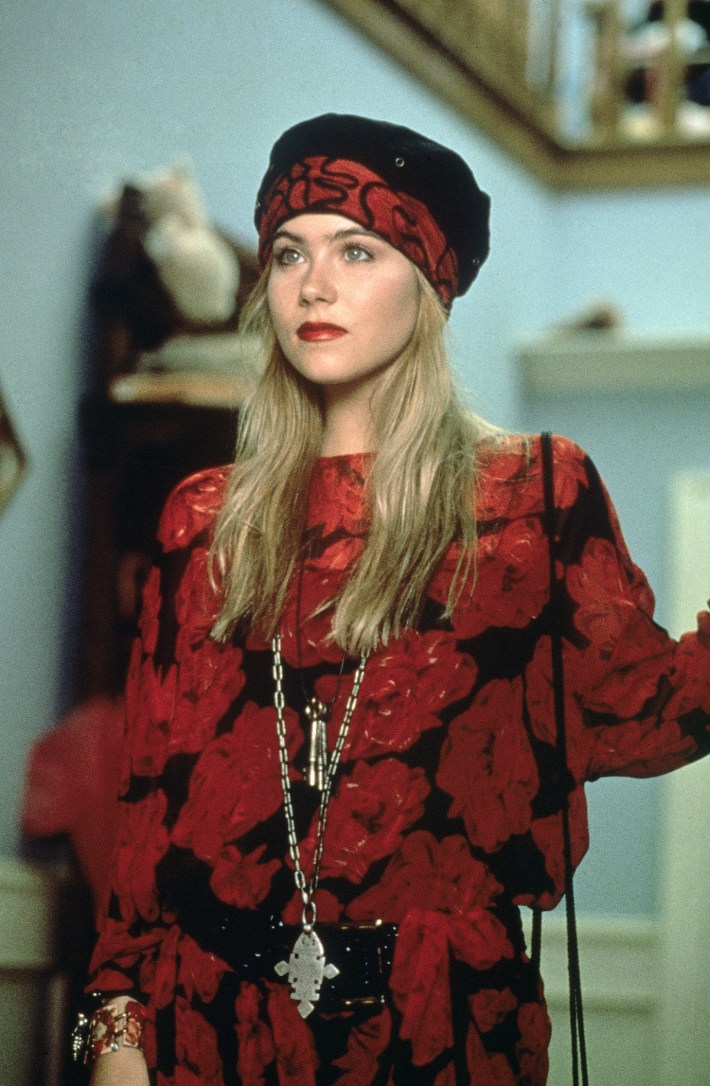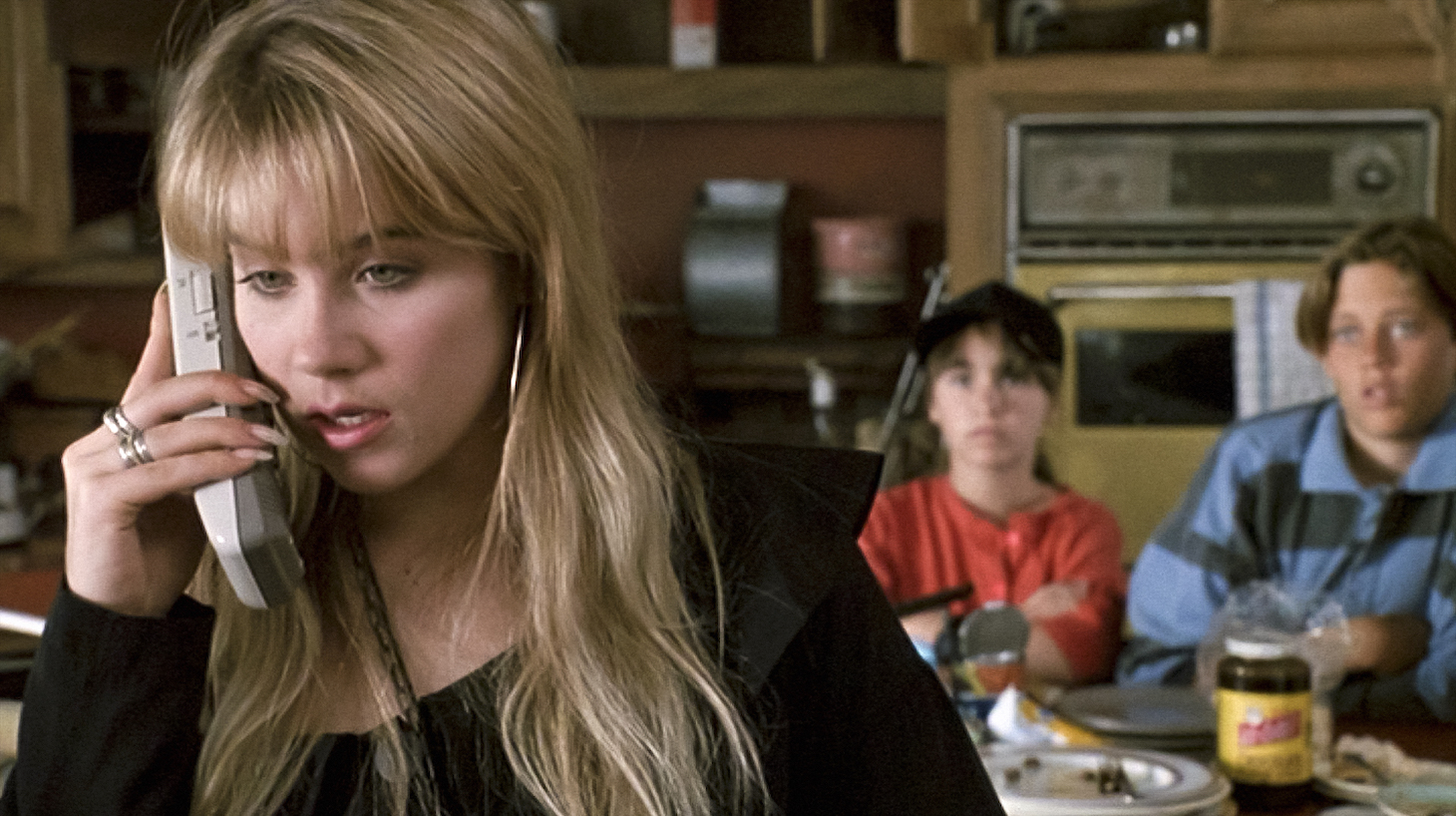“I don’t think that people really mature fast in this business. I think they have to take on a lot of responsibility, but I think the maturing process comes with experience.” It’s strange to hear this come out of the mouth of Kelly Bundy, the blond, leotarded bimbo from Married... with Children who, per what we were told, could not even spell her own name. But in 1991, four years into playing the big-haired big-boobed ditz she modeled off some chick from the 1988 doc The Decline of Western Civilization Part II: The Metal Years, Christina Applegate was doing the interview rounds for her first starring role in a mainstream movie, Don’t Tell Mom the Babysitter’s Dead. She wasn’t an adolescent herself—despite being a teen sex idol—but she wasn’t far off. At 20 she was playing 17-year-old Sue Ellen Crandell, who is forced to become a working mom when the family babysitter up and dies, leaving her to look after her four siblings while her mother is away for the summer. Over 102 minutes (bless), she transforms from a selfish shopaholic into a kick-ass matriarch (or at least what passed for kick-ass in the corporate-capitalist fever dream that was the 1990s).
In another interview from the same junket, Applegate is reserved and poised, her hands almost prissily folded in her lap. She wears a conservative black top; her face is minimally made up and her hair is straight rather than sprayed to hell like it always is on the show she is famous for. She is thoughtful and emanates professionalism. Which is why it’s sort of funny when she is asked if she missed out on a normal adolescence (in response she says she doesn’t like football, as if football defines teenage-hood, which I guess it does in Hollywood). This no-nonsense woman, who has been on screen since she was a kid, seems less precocious than she is fully cognizant of the exceptional circumstances in which she finds herself. Self-awareness is not something you tend to associate with people that young, but as someone who had been working since she was a baby, it wasn’t entirely unexpected. It’s why it makes more sense to hear this 20-year-old say she likes to stay home with her cats (“That’s my scene, I guess”). “In this business,” Applegate explains, “you may only be 17 or 19 but you have the responsibility of an adult.”
It’s this dichotomy, between breezy surface and core sensibility—though not quite as Alexis Soloski characterized Applegate in the New York Times when she wrote “her beachy looks sometimes disguised her craft”—that defines this actress and always has. This self-reflexive subversion led her to a star on the Walk of Fame earlier this month and finds its perfect home on her show Dead to Me. But its roots go back over three decades.
Don’t Tell Mom the Babysitter’s Dead landed in theaters in June 1991. I was 11 at the time but the movie is PG-13 so I must have caught it sometime after that on VHS. (It aired on HBO, but we weren’t an HBO family.) I remember the doofy cover—the old lady's legs sticking out of the grass, a bunch of kids observing from the porch, Applegate at the center of it all in a halter top as her cup floweth over: “No rules. No curfews. No nagging. No pulse.” It was exactly my kind of shit. It tracks that the writers imagined Winona Ryder in the lead because she was my obsession at the time. Apparently, the film was inspired by Risky Business—that 1983 “teen comedy” that launched Tom Cruise in which he spends the night with a sex worker while his rich parents are away—which was a little before my time. As Neil Landau, who co-wrote the script with Tara Ison, said of the initial premise for the movie in a 2015 Buzzfeed interview for Don’t Tell Mom’s 25th anniversary, “What if the parents went out of town and instead of the kids destroying everything, they got their shit together? If anybody underestimated them, what if they actually were able to function in the adult world because they were forced to — and what would the ramifications of that be?”
There were plenty of teen adulting movies circulating at the time, most of them male-driven body swaps—Big, Vice Versa, 18 Again! and Like Father, Like Son—most of which sucked. Don’t Tell Mom became the rare cult classic among them for a reason. It looked a little rough around the edges, but the casting was thoughtful, the story was well developed, the costume design was perfection (brava, Carol Ramsey, who did the equally chic Slaves of New York), and the script was smarter than your average teen fish-out-of-water thing. (“Has he just finished reading Dianetics or something?” Sue Ellen asks her coworker of her overly peppy boss.) This is more Martha Coolidge’s Real Genius than Porky’s. And that’s largely down to Applegate, who took the role of Sue Ellen because she liked the idea of a teenager becoming a parent.
“She nailed every single set-up and made it all work,” Applegate's co-star Keith Coogan told BuzzFeed. “Even when the movie doesn’t work, she makes it work. She worked 16 hours a day, six days a week, for two and a half months.” Even at the beginning when she’s supposedly a self-absorbed kid, the way she says, upon announcing her mom is leaving for the summer, “I’m a free woman,” with such bravado in her dumbass hat, convinces you that she is fully self-actualized at 17. And the way she walks away from her brother’s catcalling friends, arms almost akimbo like a cowboy about to draw his weapon, in an oversized red dress and green docs, plays as nonchalant empowerment. Which is not to say she isn’t funny—Applegate’s gravitas just happens to ground her humor in deadpan. When Sue Ellen’s mother assures her the octogenarian babysitter she hired has lots of experience, the teen drawls, “Of course she does, she’s two HUNDRED years old.”

It doesn’t really make sense to me that Applegate was ever even superficially considered a dumb blond. She may have those impish Scandinavian eyes and a cute little upturned nose, but the locus of something edgier resides in her mouth. For me Applegate’s lips are everything. They sit low on her face like they exist separately from the other features, the top lip barely there, the bottom lip full, the whole apparatus forming a sort of perma-scowl. But it’s most notably the upper central tubercle (that little hangy bit in the middle of your upper lip), the way it droops, the way when she smiles it pulls her entire mouth down, her big teeth almost obscured. It’s that particular bit of anatomy that makes her grimaces in Don’t Tell Mom so believable, like they emanate directly from her soul. Her extreme cupid bow plunges as she denigrates her mom’s “semi-wretched friends,” like she can’t help but channel Sylvia Plath’s idol Doreen in The Bell Jar, “hard and polished and just about indestructible, and a mouth set in a sort of perpetual sneer.”
In this same vein, the sexiness Kelly Bundy embodied for so many teens doesn’t quite fit Applegate. Don’t Tell Mom’s love scenes between her and her coworker have a chasteness that makes her kid brother’s virginal backseat date seem like the height of eroticism. When her boss asks whether she has ever experienced a 48-hour orgasm like she just did in Santa Barbara, Sue Ellen guilelessly responds, “No, I’ve never been to Santa Barbara.” And her absolute disgust and disappointment in the face of come-ons by her boss’s boyfriend (a flawlessly unctuous John Getz) verge on monastic. This is not a flirty woman. This is a practical woman. So, you don’t buy that she is a particularly sexual creature, but you do buy it when her mom comes home and Sue Ellen commands her with her adorably poofy teen face: “Why don’t you just, go to your room.” It’s heavy-handed satire, but Applegate sells it.
Now aged 50, Applegate is herself a mom and in fact four years older than the actress who played hers in Don’t Tell Mom. In her current series, Dead to Me, which premiered its third and final season on Netflix in mid-November, she plays Jen Harding, a widowed mom of two who unexpectedly befriends the woman (Linda Cardellini) who killed her husband. It is fitting that in what is perhaps her final role, Applegate is at her purest, a sardonic pragmatist who also happens to look like a sun-kissed bombshell, but whose sex life is less important than her platonic love life (Applegate and Cardellini have INSANE chemistry, more than either of them has ever had with their male scene partners). “Jen is me; I am Jen," Applegate told Variety recently. “There’s so much there that is at the very fibers of who I am. I sometimes didn’t know where she started and I ended.” Having recently been diagnosed with multiple sclerosis, this is likely her last acting job. But there is a thread connecting Jen and Sue Ellen and Applegate’s past and present. Youthful responsibility has finally firmed up through experience into maturity, not always a given in the real world, and even less so in Hollywood.






